Comunitat
3. Community
University and culture, a symbiotic relationship that needs to be strengthened
The UPF Culture Programme lays out an ambitious plan to place culture in the pre-eminent position it deserves at the university. It includes all the institution’s considerable historical heritage, to which it has been firmly committed since its founding, just over thirty years ago.
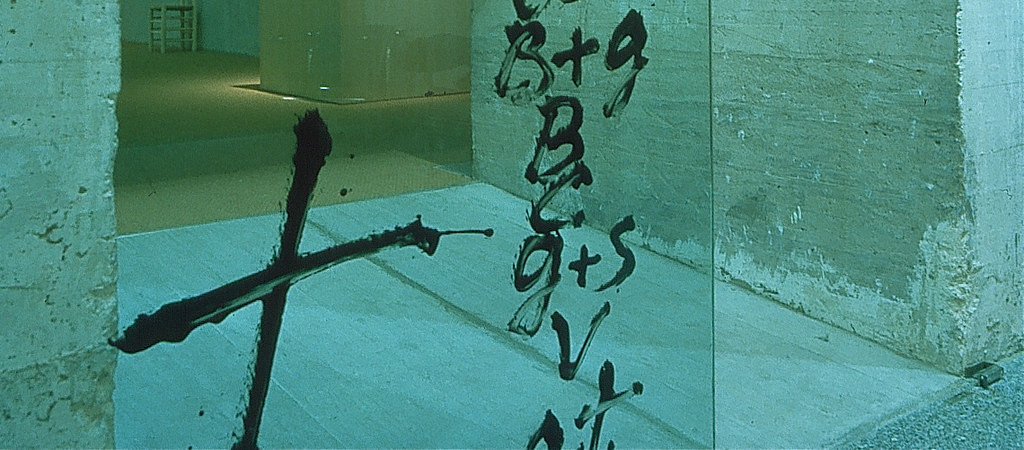
They say the best way to preserve culture is to keep creating it. Since its founding a little over thirty years ago, UPF has been firmly committed to cultivating the relationship between the concepts of ‘university’ and ‘culture’, in the same way and with the same intensity with which it cultivates quality in teaching or competitiveness in research and knowledge transfer.
The seed for this symbiotic relationship between ‘university’ and ‘culture’ can be traced back to UPF’s first rector, Enric Argullol, who had the idea of linking the institution to quality architecture and art. This was done in part by rehabilitating various charismatic spaces in Barcelona as campus buildings and by starting the collection of contemporary paintings commissioned for the commemorative posters for each academic year.
The university must be and wants to be a source of culture. In recent years, it has intensified its efforts in this regard, which have materialized in several ways. They range from direct interventions on the campuses, to the creation of a network of partnerships with external institutions
The university must be and wants to be a source of culture. In recent years, it has intensified its efforts in this regard, which have materialized in several ways. They range from direct interventions on the campuses, such as the UPF Art Track tour showcasing the artistic and cultural heritage on the Ciutadella campus, to the creation of a network of partnerships with external institutions, such as Teatre Lliure, the Joan Miró Foundation, or the Vila Casas Foundation, amongst others.
In keeping with the nature of the university’s own evolution, all this has culminated in the creation of the UPF Culture Programme, an ambitious plan to finish placing culture in the pre-eminent position it deserves at the university that includes all the historical heritage the institution has accumulated over the last thirty years. The programme is intended as ‘a project created from, by and for the university community that also reaches out to the wider world’, explained Manel Jiménez, vice-rector of Educational Transformation, Culture and Communication. He continued, ‘One of its goals is to build a network of joint efforts with other institutions, bodies, companies and individual movements to create and promote culture, without distinguishing between the university’s own space and the outside world, establishing horizontal mechanisms and unlimited relationships to take on challenges and goals.’ ‘The programme aims to become a mechanism for the real transformation of our immediate environment’, he added, ‘and, thus, to make UPF a porous institution, capable of letting the creative gene in and out with total freedom, wherever it may come from.’
In keeping with this purpose, the programme is organized around five main areas:
-
Public pedagogy
The awareness that culture is, above all, an exercise in public pedagogy, used to promote knowledge in a way that is both open and, crucially, based on continuous learning. -
Collective knowledge
The fostering of collective knowledge, on the understanding that culture must be a collaborative agent that generates content in a participatory and not necessarily hierarchical way. -
Parainstitutional cultural creation
Assumption of the need for parainstitutional cultural creation. The university understands that the production of artistic and cultural work follows a variety of circuits and depends on multiple creation, support and exhibition mechanisms. Therefore, it is not proposing a programme to compete with the stable channels of the cultural industry, but rather seeks to promote additional avenues of cultural production through research, experimentation and action. -
Spaces for action
The desire to understand the university’s role as a showcase of spaces for action at the service of a community willing to occupy them by endowing them with artistic and cultural content. -
Social transformation
The conviction that culture should facilitate social transformation and plays a decisive role in our responsibility to both the immediate and global environment.
From the world to the university
‘UPF wants to strengthen its relations with the cultural world by building networks that facilitate contact between members of the university community and society at large and the country’s main cultural institutions’, explained Jiménez. An institution of knowledge creation, the university must also become an organization that learns from others ‘whilst forging creative intersections and establishing new synergies and common strategies’, the vice rector added. According to Javier Aparicio Maydeu, delegate for culture under the former rector, Jaume Casals, ‘UPF has been working for a long time to become the link between the university world and the city of Barcelona’s most important art spaces, to allow culture and higher education to advance together and citizens and members of the university community to share a sensibility, creativity and knowledge through spaces open to the public.’
This firm commitment has materialized, for example, in agreements with leading local institutions, such as the Vila Casas Foundation, headquartered next to the Poblenou campus, or the Can Framis Museum, with which UPF will work jointly to promote contemporary art and artistic creation within the university. Amongst other things, there are plans to create an art centre, which will include the figure of an artist in residence at UPF, a joint research space, and a course on contemporary art. According to Antoni Vila Casas, president of the Vila Casas Foundation, ‘The agreement is the logical consequence of being neighbours and believing that bringing artistic creativity closer to the university sector – i.e. to lecturers, students and research groups – can be a very enriching experience for both sides. Given our Foundation’s painting, sculpture and photography collection, I think an agreement with UPF will bear a variety of fruits quite quickly.’
"The harmony with all these institutions allows UPF to strengthen its profile as an urban university, connected with its most immediate surroundings, i.e. Barcelona, but also open to the rest of the world"
This agreement has been joined by others as part of a strategic plan to foster relations with the city’s main art centres and ‘greatly enrich the university’s desire to be part of the living world of creation’, said Aparicio Maydeu. For example, UPF recently signed an agreement with the Joan Miró Foundation, providing for both the temporary loan of two pieces from the Foundation’s collection to the UPF Art Track and the creation of the Joan Miró Foundation-UPF Contemporary Art Chair for the dissemination and study of the artist’s work. All of this is done with the aim of promoting and integrating culture into the university’s traditional missions of teaching, research and knowledge transfer.
The most recent example is the agreement signed last December with IDEAL Digital Arts Centre, a new space in Barcelona showcasing immersive aesthetic experiences. According to Jordi Sellas, director of IDEAL, ‘The agreement with UPF will allow us to conduct joint research in this field from an open, creative and ambitious perspective’, clearly aligned with that advocated by the university’s Culture Programme. In this case, it also means ‘having a space for exhibitions, production, and training for immersive creative internships, which, to date, lacked a venue for public presentation and, thus, a natural circuit for ideation, production and exhibition’, said Jordi Balló, dean of the Faculty of Communication.
For Aparicio Maydeu, ‘The harmony with all these institutions allows UPF to strengthen its profile as an urban university, connected with its most immediate surroundings, i.e. Barcelona, but also open to the rest of the world.’
It is precisely this mindset that led to the university’s commitment also to bring culture closer to the university community by bringing world-class artists to the campuses. One need only look to the gallery of figures awarded honorary doctorates by UPF, amongst whom there is no lack of culture. Film, music, painting and literature are all well-represented amongst the recipients of this distinction. For instance, of the last five people to be awarded an honorary doctorate, three are very closely linked to the world of culture: the publisher, historian and writer Gonzalo Pontón; the pianist Maria Joao Pires; and the filmmaker Frederick Wiseman.
The university thus seeks to highlight, recognize and increase the visibility not only of figures with distinguished scientific careers, but also of figures known for their activity in the cultural sphere.
Another good example of this desire to move beyond the university’s walls to bring culture – in the broadest sense of the word – closer to the community is the creation of the literary collection, under the leadership of UPF Barcelona School of Management. For the last four years, the university has presented its members with a bilingual edition (Catalan and the original language of the work) of a classic of universal literature. Accompanied by various cultural activities related to the work, this action ‘helps explain, from a humanistic point of view, certain concepts in curricula from a wide variety of fields’, said Mathilde Brodu, head of Culture at UPF-BSM. The proposal is swiftly becoming a hallmark of the university.
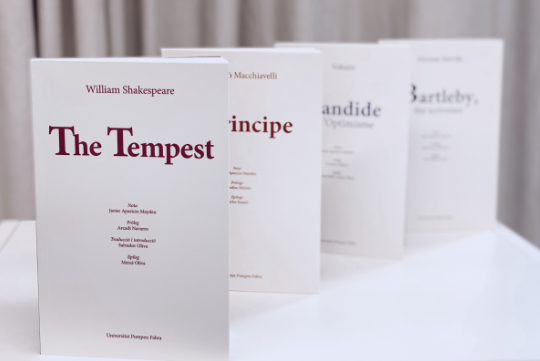
For Brodu, ‘Reading any classic is a challenge, in terms of interpretation, deciphering, analysis, comprehension… That type of literary experience should not be limited to people who have devoted themselves to literature. Anyone who allows him or herself to be captivated by the originality of the story can bear witness: imagining, thinking, finding solutions are tasks that all participants from the UPF community can feel challenged to do.’
The first four works published are Bartleby, the Scrivener by Melville, Candide by Voltaire, The Prince by Machiavelli, and The Tempest by Shakespeare. The new bilingual editions are moreover accompanied by texts by lecturers who focus professionally on issues related to the work, but are not necessarily experts in literature. This helps frame the work, from a contemporary perspective, and encourages the community to learn from the classics, exploring universal and transdisciplinary themes through literature.
It is in these texts that we find the proposal’s raison d’être, in this case, as described by Aparicio Maydeu, in his introductory note to the first reissued work, Bartleby: ‘UPF has always chosen to add culture to teaching […] Literature does not belong to the person of letters, just as art is not the sole property of the artist. Economics is not limited to the economic sphere; like law and history, it is part of our common world heritage […]. Pompeu Fabra University wants the performing and visual arts, literature and architecture, music and any imaginable manifestation of human sensibility to be part of university life beyond mere well-meaning rhetorical desires.’
Culture has also entered the campuses through the In itinere proposal, an action that transforms university spaces into venues for exhibitions united by their focus on actions arising from teaching or research activity. The first such exhibition, promoted by UPF Barcelona School of Management, was ‘Bauhaus: el gresol de la modernitat’ [Bauhaus: The Cradle of Modernity], with the support of the Mies van der Rohe Foundation. The show sought to reflect how the Bauhaus school has influenced our daily lives and to highlight the importance of its education model at a time like today, marked by dramatic shifts in pedagogical paradigms. The exhibition was rounded out with a conversation between two experts held on the Mar campus, within the framework of the Open City Biennial of Thought.
From the university to the world
The UPF Culture Programme is eminently eclectic, in terms of both the formats and the artists behind the actions and the audiences they target. As a living and active institution, the university, through its various groups – students, teaching and research staff, administrative and service staff – plays the leading role in many cultural initiatives.
One of its boldest proposals, which this year celebrates its fifth anniversary, is UPF Art Track, the tour of the Ciutadella campus’s artistic and cultural heritage made available to the wider world through the Barcelona Contemporary Art Circuit and the Google Arts & Culture platform. Inaugurated on 18 May 2016, International Museum Day, as part of the activities commemorating UPF’s 25th anniversary, it invites visitors to discover the university’s original relationship with art and culture through a tour of the campus’s iconic spaces, featuring works by such acclaimed artists as Miquel Barceló, Eduardo Chillida, Joan Miró or Susana Solano, amongst many others.
One of the most singular spaces is Antoni Tàpies’s Reflection Room, the nerve centre of the tour and one of just two secular chapels in the contemporary art world. Another is the Dipòsit de les Aigües building, calculated by Antoni Gaudí and with close links to the Basilica Cistern in Istanbul, featuring a hypostyle hall with 100 pillars rising 14 metres high to support a maze of arches.
The UPF community also plays a key role in the generation and transmission of culture and humanism to society. One recent action that has been very well received by the broader local community is the UPF Humanistic Dialogues series, with Tamara Djermanovic, a lecturer from the Department of Humanities, as the academic director. Launched in 2016, the initiatives’ main aim is to open the university’s doors to all society so as to address – under the guiding thread of humanism – issues of general culture, politics, history, biomedicine, ethics, philosophy, psychology or economics, always based on the intersection of two experts from different fields.
This year, the series was kicked off by the artist Jaume Plensa, one of whose pieces is also featured in the UPF Art Track circuit. He spoke with Professor Djermanovic herself and reflected on how art becomes the space for true human communication.
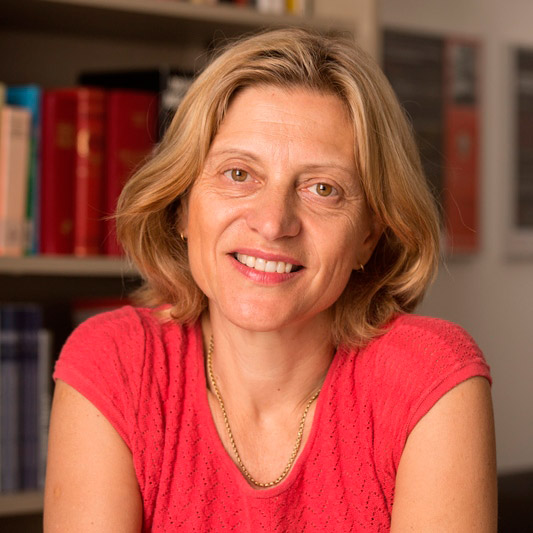
Tamara Djermanovic
Talking with Plensa: privilege and joy
When Plensa agreed to inaugurate the 2021 edition of UPF’s Humanistic Dialogues, the first thing I thought was, ‘Every cloud has a silver lining.’ I had tried to get him to come the previous year, but between trips, prior engagements and his work as an artist, he told us, ‘Maybe in the future.’ This year, 2021, was the first edition of the Dialogues under Covid-19, and the joy and happiness with Plensa in these strange and challenging times were memorable. Given that I lecture on the aesthetics and theory of art, it seemed reasonable that I would have the privilege of speaking with Jaume Plensa and, more accurately, of preparing the questions to enable this magnificent artist – and, also, ‘beautiful soul’ – to share his creative secrets and his measured, sincere and comforting thoughts with a very large audience (the 900 streamed connections nearly crashed the system).
Choosing which questions to ask to make the best use of the time, and, especially, of his presence, was not easy. Behind my seeming spontaneity lay long days of preparation, to select the best topics to prompt Plensa to talk about his work, his vision of creativity, but also his doubts.
When he spoke about creating, Plensa said that the most important thing is doing. ‘If you think before you do, you won’t do anything’, he said. ‘You have to let things flow. There will be times when you are not doing anything and then, suddenly, things will start to well up. The important thing is to be working in the studio when they do.’
Plensa was speaking from the heart, but also from a place of authenticity, which you could say was the driving force behind every word he spoke to the audience.
With much of his work in the public space, both urban and in natural settings, he feels that ‘the public space is a magnificent place to share art democratically’. ‘The public space’, he added, ‘is a place of great opportunities but also extraordinary challenges, because there is no context. It gives people absolute freedom to interpret as they will.’
Sometimes, if a question struck him as overly eloquent, he would exclaim ‘Oh my!’ before answering. Amongst his sources of inspiration, he recalled the Romanic art he saw at the National Museum of Art of Catalonia (MNAC) when he was young. There he fell in love with a hand of God, the rough background behind the Virgins, the colours of religion… Also, the alabaster they used in the windows, that incomplete stone that lets light through and, according to Plensa, can be a metaphor for human beings. Another source of inspiration came to him from literature. His cornerstones were Dante, Shakespeare, Baudelaire and William Blake. Over these four writers, he explained, ‘I built my life and my personality’. He would later add others, such as William Carlos Williams or T.S. Eliot.
My last question was whether it is true that ‘no one is a prophet in their own land’. He chose not to answer directly. ‘Barcelona’, he mused, ‘got a bit distracted. […] Things are happening in other parts of the world’, he concluded.
In the six editions held to date, the Dialogues have featured around fifty conversations and been followed live by more than 10,000 people. Djermanovic attributes this resounding success to ‘the proposal’s consolidation amongst society and UPF students and lecturers who do not come from the field of the humanities themselves, which was one of our main goals’. She added that, even though this year’s edition was held online due to the pandemic, ‘it has already established itself as a meeting point between the various UPF groups and people from the city, and a leading annual event related to culture that lasts a few weeks’.
The Performing Arts Workshop, an indisputable benchmark
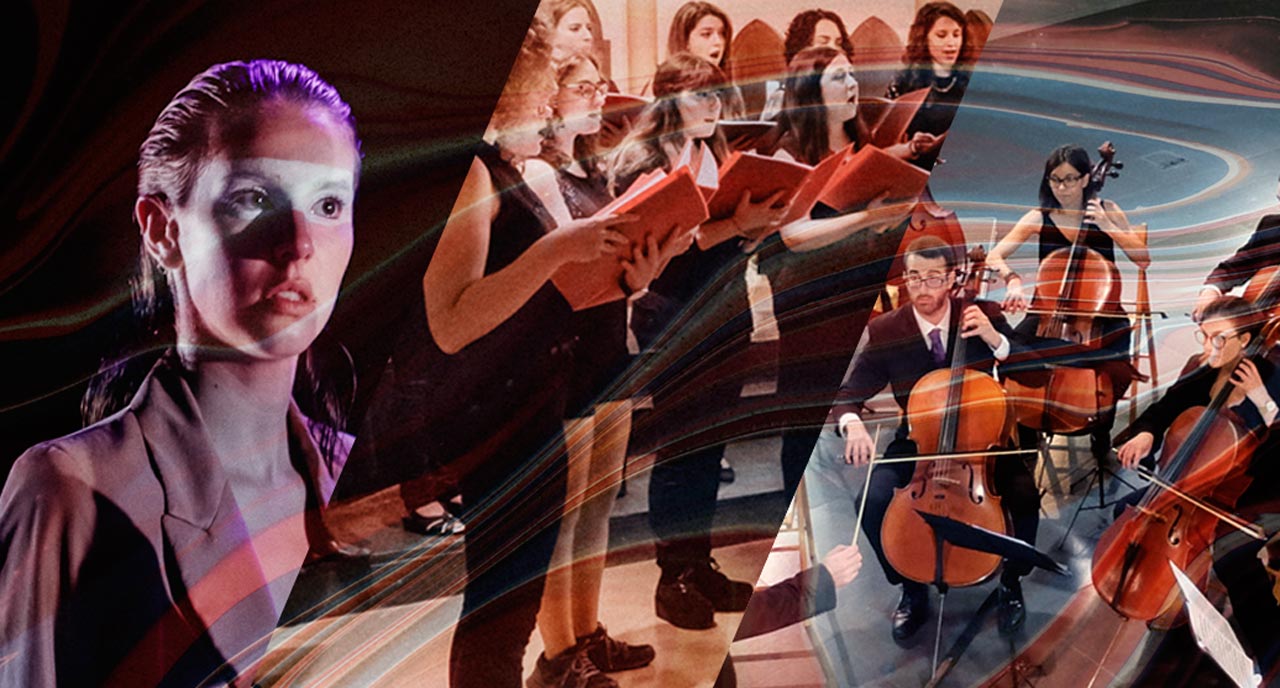
The Theatre Group, Chamber Orchestra and Choir are three inextricable parts of UPF’s existence. Present at the most important institutional events – ceremonies for the award of honorary doctorates, graduation ceremonies, course inaugurations, the Christmas event, etc. – the Performing Arts Workshop has established itself as an internal and external showcase of the cultural talent emanating from the community itself. With their long history, the three component groups are pillars of the university’s cultural action. This year, despite the pandemic, nearly a hundred people, including undergraduate and postgraduate students, alumni and people from outside the university community, actively took part in them.
the Performing Arts Workshop has established itself as an internal and external showcase of the cultural talent emanating from the community itself. With their long history, the three component groups are pillars of the university’s cultural action
Gemma Garcia, head of the University Community Assistance Service (SACU), which manages the Culture area, explained, ‘All activities contribute and enrich, but I am especially satisfied with those that have a strongly performative dimension, in which the students play a leading role.’ ‘That is the case with the Performing Arts Workshop or the debate leagues’, she added. She also highlighted new proposals, such as Class Zoom, ‘an activity that aims to encourage debate and reflection on key issues based on quality audiovisual productions, with the assistance of expert lecturers.’
The pandemic has particularly impacted the Performing Arts Workshop’s activities. Nevertheless, ‘they quickly shifted to the virtual environment and adapted the end-of-the-year workshops’, said Garcia. ‘For instance, the Theatre Workshop created virtual capsules called Truca’m i t’ho explico [Call me and I’ll explain].’ In a normal academic year, a remarkably large number of people participate in and enjoy cultural events. ‘By way of reference, in the 2018/2019 academic year, before the pandemic, 653 people participated directly in these activities and 9,129 participated as spectators.’
To truly grasp what the Workshop means and understand its vision of the importance of culture at the university, we spoke with the three directors: Pep Anton Gómez, director of the Theatre Workshop; Aída Vera, director of the Choir; and Diego Miguel-Urzanqui, director of the Chamber Orchestra. We also spoke with three students who participate in the various Performing Arts Workshop sections.
Theatre Workshop
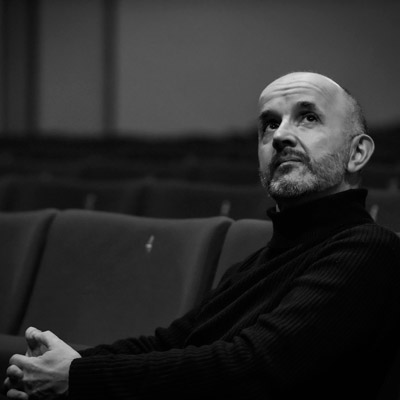
Pep Anton Gómez
director of the Theatre Workshop
Pep Anton Gómez holds degrees in acting from the Institut del Teatre and in Economics and Business from the Autonomous University of Barcelona (UAB). He has worked as a playwright and director on more than thirty theatrical productions. He has also worked as a screenwriter and director on various television programmes. He has been a lecturer at the Institut del Teatre and the UPF Theatre Workshop since 1993 and director of the Workshop since 2000.
What role does theatre play in university students’ education?
In addition to being a very important contact for them with the world of art and emotions, it is usually an experience that helps them grow and get to know each other, quite closely, for the three or four years that, on average, they are part of the Workshop.
How do you work with this group? What do you ask of them?
I focus a lot on group dynamics, group work. But I also pay close attention to each member’s personal development. Based on that, I propose the most appropriate or useful individual work for them.
What do you think of the university’s commitment to culture?
I have a very positive opinion of it. Over all these years, I have witnessed the university’s support and efforts to ensure students have the broadest and most committed contact possible with culture, regardless of the field.
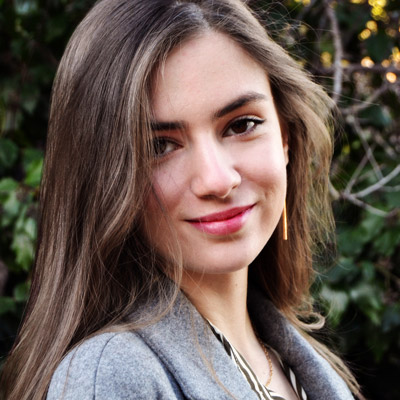
Anna Maíllo Domènech
Theatre Workshop member
Anna Maíllo Domènech is a third-year student on the Advertising and Public Relations degree programme. She enrolled at UPF through the Open Degree programme (combining Political Science, Translation and Interpreting, Law, Audiovisual Communication and, finally, Advertising).
What prompted you to joint the UPF Theatre Workshop?
At home, we would go to the theatre a lot, to see both conventional plays and musicals, even though none of us had ever done any acting. Plus, I’ve always really enjoyed the world of film. I reckon all of that is what sparked my interest in telling stories. I’d always listened to stories, whether live, on screen or in a book. When I got to university, I decided I wanted to try my hand at being the one who told them. I should probably mention that I’ve always been a bit dramatic (hey, no one’s perfect!), so I wanted to take advantage of the opportunity to do theatre.
Still, it wasn’t until my second year at UPF that I dared to audition. I had been thinking about trying to do theatre, rather than just watching it, for a while. But I had no idea where to start, because I didn’t know anyone who could give me guidance or who knew anything at all about acting.
Until I discovered the Workshop. And right then and there (you might say in a moment of courage), I decided to sign up for the try outs.
What role do you think theatre plays in university students’ education?
Theatre teaches students aptitudes that go beyond whatever degree programme they’re studying. I guess the Workshop experience is different for each member, but in my case, I’ve learnt to choose my words much more deliberately and be careful how I say them. It helps you look at the language you use, both verbally and in terms of your body language, and understand that they are equally important. Speaking is something we do every day, and the university is no exception, yet we don’t have any specific training on how to speak or express ourselves, which is strange considering what a vital tool it is. And not only do you learn to be more careful about how you speak, but also to listen to others. You end up understanding that words have many different interpretations, and that each person has a story or message that he or she is trying to get across to others.
What do you think about the university’s commitment to culture?
I don’t think anyone would be surprised to hear that, a lot of times, culture is not regarded as an essential service. We see it every time there’s an economic downturn. This last year, with the pandemic, is just another example. So, given how often decisions are made to dispense with or not adequately protect the cultural sector, it is nice to see the university struggling to support it. If the university does not strive to preserve culture in its community, it is hard for me to imagine where it will be given the importance and weight it deserves. As for the Theatre Workshop in particular, it has provided me with more ‘normality’ in the context of this exceptional situation.
Chamber Orchestra
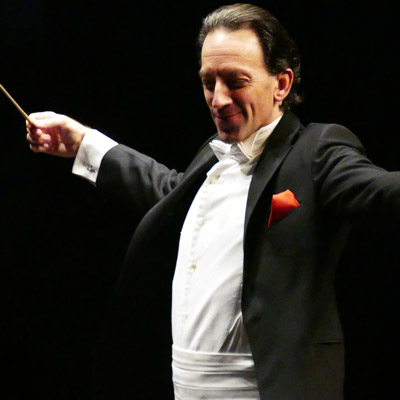
Diego Miguel-Urzanqui
conductor of the Chamber Orchestra
Diego Miguel-Urzanqui is an orchestra conductor, lecturer on chamber music and violinist who, since 1998, has pursued a career in music that has taken him to concert halls in Europe, Asia, Africa and the US. He is currently the guest conductor of the Rencontre Internationale de Guitare Classique de Nice (France) and musical director of the Orthemis Orchestra (Nova OCE), as well as a lecturer on orchestral practice and chamber music at Pompeu Fabra University.
What role does music play in university students’ education?
Musical practice is more than just mastering an instrument and enjoying the wide world of sound. Music is an art form that requires such essential life values as respect, dialogue, perseverance, effort, attitude, responsibility, etc., to do. Although it may be at an unconscious level, music helps shape my students as people. It is a discipline that not only fosters sensitivity to art and beauty, but also plays an even more vital role for students, forcing them to work on aspects very similar to those they need to successfully socialize in today’s society.
How do you work with this group? What do you ask of them?
The goal I propose to my students is to go as far as they can in the artistic, technical and musical fields. I want to encourage them to achieve the best results at the moment they are currently living, whether as university students, alumni or just amateur musicians from a different professional world. My job, in part, is to help them hone their listening and critical thinking skills, to strive for excellence at all times and not to settle for the first thing they achieve with the excuse that they are amateurs or at university. For the relationship between university life, social life and orchestral life to succeed, the rest depends on my ability to understand each one’s context and keep them motivated and excited within the orchestra.
What do you think of the university’s commitment to culture?
From the moment I arrived at UPF, I could see there was a very serious and strong commitment to culture. The university offers its students orchestral practice, chamber music, choral practice, singing lessons and theatre. The University Community Assistance Service, or SACU, which coordinates and manages all these activities, not only takes care to place the best professionals at the head of these disciplines, but also provides everything necessary – logistically and humanly – to make culture a reality and for students to have the great opportunity to continue enjoying culture during their time at university. That would not be possible if UPF were not especially sensitive to culture.
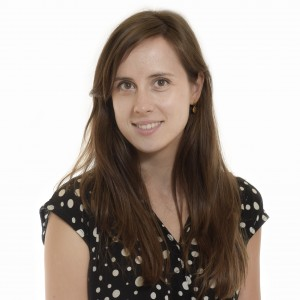
María Caballero de la Torre
Chamber Orchestra member
María Caballero de la Torre holds an undergraduate degree in biology and a master’s degree in Therapeutic Targets from the University of Alcalá de Henares (UAH). She is currently a doctoral student in Biomedicine at UPF, where she is researching new cancer drugs at the Cell Signalling Laboratory, under the direction of Drs Francesc Posas and Eulàlia de Nadal.
What prompted you to join the UPF Chamber Orchestra?
I started playing the oboe when I was 7, and I have played in various musical ensembles ever since, including the Tarancón municipal band, the Cuenca youth orchestra, and the Barcelona Biomedical Research Park (PRBB) orchestra. I cannot conceive of my life without music. When I began my doctoral degree, a friend who played in the UPF orchestra told me they needed wind instruments. I thought it was a great idea to round out my musical training, as I could combine it perfectly with my studies.
What role do you think music plays in university students’ education?
Although I am not an expert in neurobiology, I have always been very interested in the role that music plays in our brain. Listening to music causes our brain to release dopamine, a neurotransmitter associated with pleasure, which helps reduce anxiety and improves heart rate and mood, amongst other benefits. And whilst listening to music passively has positive effects, actively making music by playing an instrument has even more. Learning to play an instrument is a complex task involving the interaction of multiple cognitive functions that increase brain plasticity, that is, that generate new neural connections and modulate brain structure. Also, numerous studies show that music enhances cognitive, creative, intellectual and psychological development. Amongst music’s countless benefits, for students, I would highlight its ability to reduce stress and provide training in patience, discipline and perseverance, all of which are tremendously useful for any university education. Finally, the context of the orchestra makes it easier to develop personal relationships with people from different degree programmes, in addition to encouraging teamwork.
What do you think of the university’s commitment to culture?
UPF’s offer of various cultural activities, such as participating in the Chamber Orchestra and being able to combine it with our respective degree programmes, is a great educational opportunity for us. In the context of the Covid-19 pandemic, the university also offered us the opportunity to form three- and four-member chamber music groups as an alternative, to keep up our musical training during this period. Even though the concerts and rehearsals with the full orchestra really motivate us from a musical and personal perspective, the context of small chamber music groups has provided different musical values. The demands in terms of practicing and the small size of the groups required close understanding between the participants and provided an essential opportunity for us to improve individually.
I would also highlight the great effort made by of our devoted and committed conductor, Diego Miguel-Urzanqui, who has always shown infinite patience and great involvement in our training. Diego guides us and encourages us to work on skills such as our sense of rhythm, phrasing, ear, pitch, even the gestures required to communicate without a conductor, as well as group balance and coordination and instructions for rigorous individual training to ensure proper interpretation within the group. He adapted quickly to the pandemic situation, organizing seven small chamber groups to offer more individualized attention and enable two end-of-the-year concerts with an exceptional musical repertoire.
UPF Choir
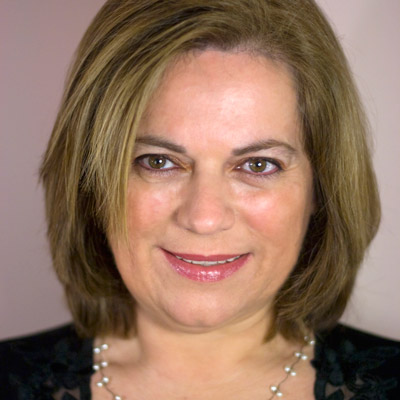
Aída Vera Jiménez
conductor of the UPF Choir
Born in Las Palmas de Gran Canaria, in the Canary Islands, Aída Vera Jiménez studied voice in Las Palmas, Vienna and Barcelona, performing in Spain, Germany, Austria, New York and Brazil. She has collaborated with the Chorus of the Gran Teatre del Liceu (Barcelona), amongst others, and released three CDs. She has been the conductor of several choirs since 2001 and, since 2009, she has been a lecturer and director of the UPF Voice Workshop.
What role does music play in university students’ training?
It is an essential complement for the cultural training for any university degree programme. Music fosters creativity and artistic sensitivity. Students learn to socialize, work in a team, and have individual and group discipline. In the case of choral singing, they learn to use their voice and work on texts in different languages, perfecting their diction. It is one of the few activities, perhaps the only one, that stimulates all areas of the cerebral cortex, since singing simultaneously activates the auditory part, the region responsible for controlling muscles and posture, and the one responsible for speech and rhythm. The frontal and temporal lobes work at the same time. It is a constrictive and therapeutic way to develop the body, mind and emotions. So, it allows people to overcome stress and find their own balance.
How do you work with this group? What do you ask of them?
At the rehearsals, we stretch and do breathing and vocalization exercises to warm up our voices properly before singing the repertoire. We work on a lot of important aspects, such as pitch, lyrics, rhythm, vocal techniques, vocal layering, good posture, and group coordination.
I explain the piece, the composer, the period, etc., to the students. I always try to make rehearsals dynamic and agile, so they can enjoy making music together as much as possible. The essential requirements to participate in the Choir are pitch, a sense of rhythm, a healthy voice and, above all, a personal commitment to attend the rehearsals and performances. I give priority to people with musical training. To be able to work in the right conditions, I ask for silence, out of respect for the other Choir members, the music and myself. I need them to feel comfortable and at ease, but, in return, I ask them to collaborate by preparing the repertoire at home when I notice individual problems learning it and, in general, to supplement the work we do at rehearsal.
What do you think about the university’s commitment to culture?
I think it’s good. However, ideally music should be a subject on the university curriculum, like it is in other countries. We need to realize that music is the best tool for teaching teamwork. That is why it is important for the university to collaborate with the Choir, facilitating students’ attendance of rehearsals through the class schedules.
Currently, students who participate in the Choir earn two ECTS credits per academic year. More academic stimuli are needed to attract them, just as many universities do with athletes.
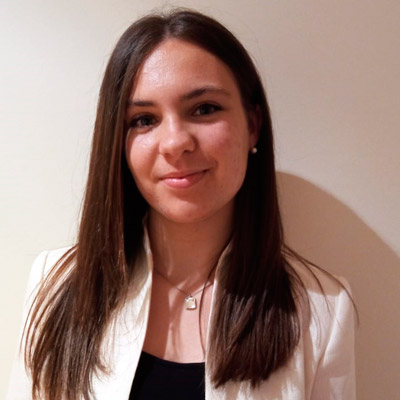
Clara Roig Boada
UPF Choir member
Clara Roig Boada is a third-year student on the double degree programme in Translation and Interpreting and Applied Languages
What prompted you to join the UPF Choir?
Music has always taken the form of choral singing in my life. I began to sing at a very young age, in a children’s choir in my home town of Valls (Tarragona). I am still a member, as a conductor of a group of children. However, the idea of moving to Barcelona to study struck me as empty if I would not be able to continue to hold on to the motivation I got from singing. So that was when I decided to join the UPF Choir, where I would not only meet new people, but also interact with people with whom I share a hobby.
What role do you think music plays in university students’ training?
When we talk about ‘university’, we think about a place for studying, working, attending class, etc. But it is so much more. It is a place that opens the doors to the future, not only through training, but also social activities. Music and, in particular, singing in a choir awaken in people the ability to feel free and disconnect from the concerns they encounter in their everyday lives, whether in their studies, their jobs, at a personal level, etc.
What do you think of the university’s commitment to culture?
Choosing a university that makes cultural proposals an active part of the experience will always be a good option. Culture is our identity and knowledge, our future. The combination makes us grow and opens up a range of possibilities in the world for us, even as we strengthen our roots.
Singular features of the university’s cultural proposal
The eclecticism of the actions that form part of the UPF Culture Programme finds its maximum expression in two singular proposals: the Micromégas blog, a macroscopic look at the microscopic universe of knowledge; and the experimental theatre project Les Malnascudes.AV, which gave rise to the EMPÍRIC action.
In its own words, the Micromégas blog, launched in 2020 at UPF Barcelona School of Management, aims to be ‘an anarchic instruction manual for learning to observe the infinity of knowledge from the smallest of particles… and the tiniest detail of culture from the stratosphere’. Furthermore, it aims to achieve this based on knowledge, arts, culture, thought and science, ‘blurring the classical categories that define things’.
The blog features experts from a variety of fields – law, humanities, communication, health and life sciences, economics, etc. – from both UPF and other institutions, who reflect on transcendent life issues linked to the current times. The proposal also includes the voices of students from the university itself, for example, through HERSTORY, an initiative intended to give greater visibility to women who have left their mark in fields ranging from politics to science, literature or film.
Malnascudes.AV was a specific, one-off action carried out in 2019. However, it planted the seed for what will become EMPÍRIC, a new venue for experimental theatre, halfway between theatre, audiovisual arts and interactive technology. The university thus also aims to lead the way in promoting new forms of cultural production resulting from research, experimentation and creative action. The initiative, which builds on an existing young creation laboratory in the field of the performing arts at the Sala Beckett theatre, is intended to eventually include an annual call for companies that engage in performance art from an experimental perspective.
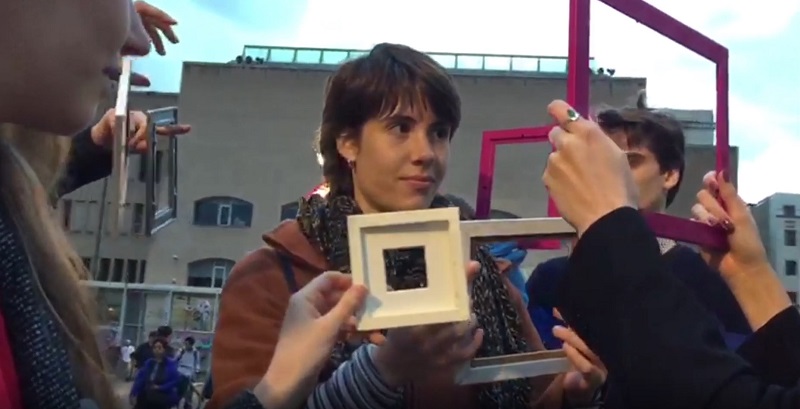
"Qui és la meva mare avui en dia? Segur que la nostra mare, la que ens va parir, és l’única que ens fa de mare avui en dia?"
Les Malnascudes interview (November, 2019)
Culture is included on students’ transcripts
The UPF Culture Programme ‘integrates the various teaching activities arising from initiatives not strictly linked to scientific research, but rather having to do with the production of knowledge related to the arts, humanities, technology and social sciences targeting the cultural industries’, explained Jiménez.
This proposal fits seamlessly with one of the strategic projects that the university is implementing, EDvolution, which aims to transform UPF’s education model to adapt it to students’ current and future needs and turn it into a unique model that both characterizes and differentiates future graduates. Amongst other things, the new model seeks to promote educational transdisciplinarity, with the aim of fostering multidisciplinary knowledge, where the various branches of knowledge make it possible to find solutions in diverse contexts based on overlapping and complementary approaches. In this regard, UPF wants culture and humanism to permeate the entire university, cutting through the invisible barriers that sometimes exist between different fields of knowledge.
This proposal fits seamlessly with one of the strategic projects that the university is implementing, EDvolution, which aims to transform UPF’s education model to adapt it to students’ current and future needs and turn it into a unique model that both characterizes and differentiates future graduates
To achieve this, ‘work is currently underway to launch a minor in cultural creation and practice open to any student, no matter what degree programme they come from. The minor will address activities related to cultural design, production, creation and management’, Jiménez explained.
Minors allow UPF bachelor’s and master’s degree students to earn a university-specific degree that certifies the knowledge and skills they acquire outside the core work for their degree programme. Thus, a student on the bachelor’s degree programme in Human Biology, for example, could graduate with recognized knowledge of culture, which would help differentiate their profile.
Separately, EDvolution also includes a plan to create a UPF Passport, a differentiating tool that the university’s students can use to showcase the skills, competencies and knowledge they acquire over the course of their studies in the framework of multiple training activities offered by UPF. In addition to traditional qualifications, this passport will include achievements related to their participation in cultural activities, such as the Performing Arts Workshop, debate leagues or the Humanistic Dialogues, and will even allow them to obtain a specific culture visa.



